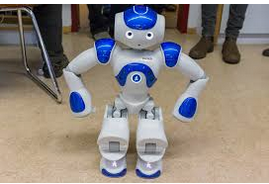
credit Marco Verch, Flickr, creative commons
One of the speakers invited to the Current Trends in Biotherapeutics Workshop, hosted by the Clinical Translation Education Group (CTEG),* was Alexandre Le Bouthillier, co-founder of Imagia. This Montreal-based company is harnessing the power of artificial intelligence (AI) to improve health care.
A great deal has been written and debated about the power of AI and how it will transform society and, in particular, health care. There are lots of warnings that AI will steal jobs (47 percent of total U.S. employment is at risk) says this study from the University of Oxford, which was apparently the inspiration for a website called “Will Robots Take My Job?”
This fun or frightening website – your call – allows you to type in a career and determine the likelihood that it will be replaced by, um, robots. (If I define myself as a corporate communications professional or a blogger, the job doesn’t even register on the site. If I type in public relations specialist, I am 18 per cent likely to lose my job. I think I’m pretty safe. However, at 70 per cent, avionics technicians might want to start retraining.)
While conversations about AI can be affirmative, alarmist or anxiety-inducing, for Dr. Le Bouthillier the desire to work in AI comes from a deeply personal place. Dr. Le Bouthillier had already launched and sold one company that used AI to optimize employee schedules while solving logistical problems for the employer, when he decided to shift his focus to the medical field. At the time, his father had been diagnosed with cancer.
Imagia relies on artificial intelligence for cancer screening. As Dr. Le Bouthillier said at the Workshop, AI “speeds up time.” That was important when his father was diagnosed and it remains crucial today as an early diagnosis can have a significant impact on treatment.
Imagia’s platform is called Evidens and it uses algorithms to produce biomarkers based on digital images that track how the illness is progressing in a patient. As the Imagia website states, “EVIDENS is a unique collaborative AI ecosystem that gives hospitals, medical device manufacturers, pharmaceutical companies and diagnostic companies the opportunity to benefit from a broad clinical network and the ability to use personalized medicine to its fullest potential.”
Despite this important work, AI still needs to be regulated. An advisor to Imaglia, Yoshua Bengio at the Montreal Institute of Learning Algorithms, has written about Canada’s role in developing ethics policies and monitoring the potential abuse of AI. This leads me to the Montreal Declaration for Responsible Development of Artificial Intelligence, signed December 4, 2018, and spearheaded by the Université de Montréal.
The declaration has three main objectives, the first being to “develop an ethical framework for the development and deployment of AI” […] “based on the following values: well-being, autonomy, intimacy and privacy, solidarity, democracy, equity, inclusion, caution, responsibility and environmental sustainability.”
One day robots may be able to write such a declaration with an appreciation of what those principles mean – yes, I appreciate the irony – but for now we still need people, from all walks of life and with their unique values and perspectives, to understand those nuances and imagine where unchecked AI could take us.
Dr. Le Bouthillier and his colleagues are using AI to help patients and health care providers. Good luck to Imagia.
If you missed the Workshop, CCRM will be posting videos of the talks on its website, as soon as they become available. Other CTEG partners may also make them available. Please check their sites. Videos from the 2018 and 2017 events can be found here.
*CTEG is comprised of BioCanRx, CCRM, CellCAN, the Ontario Institute for Cancer Research, the Ontario Institute for Regenerative Medicine and Stem Cell Network.
Stacey Johnson
Latest posts by Stacey Johnson (see all)
- Right Turn: Top 10 blogs from 2025 - January 9, 2026
- Right Turn: Season’s greetings and upcoming event - December 25, 2025
- Right Turn: Stem cell supplements: A growing market with growing risks - December 19, 2025






Comments